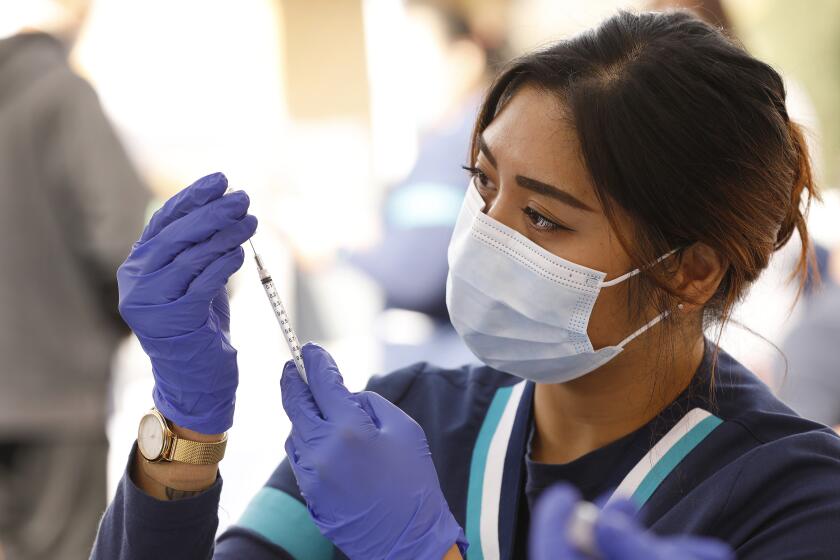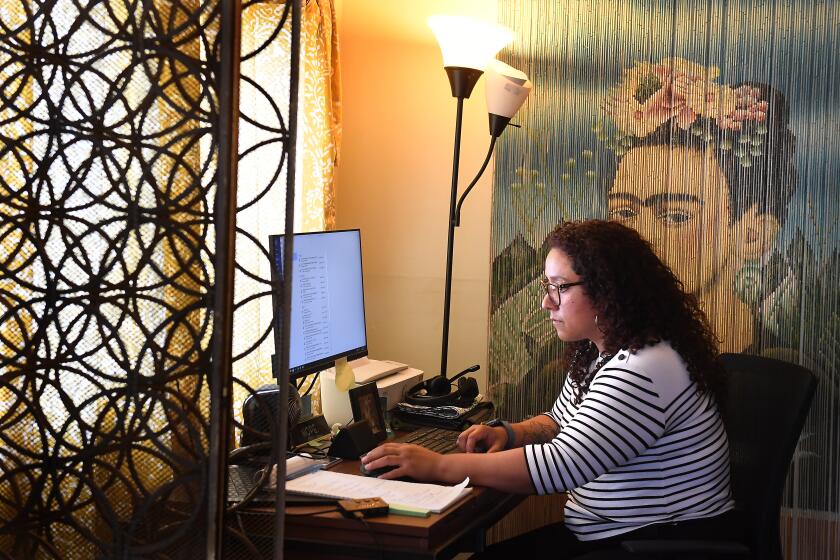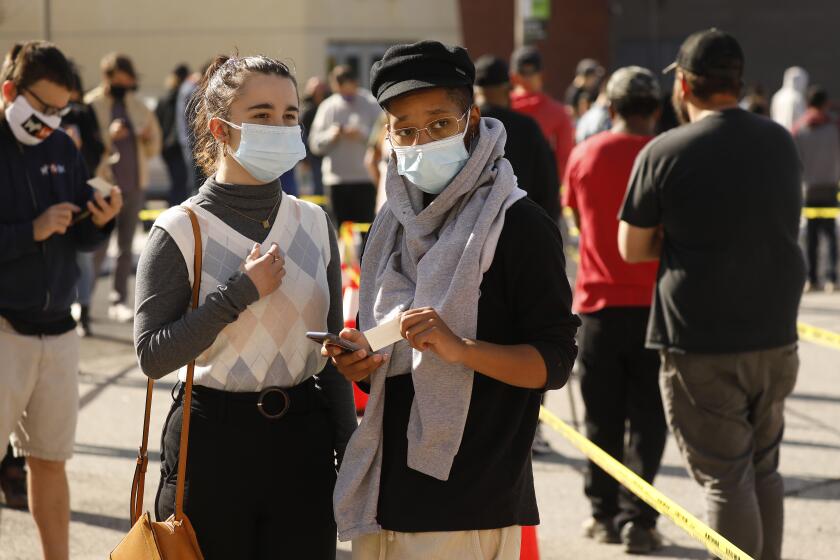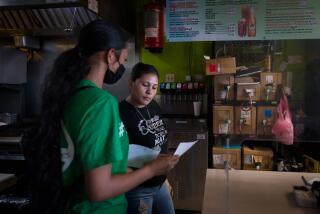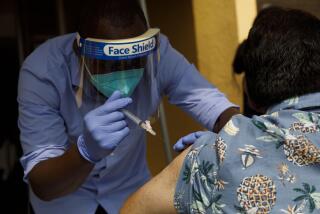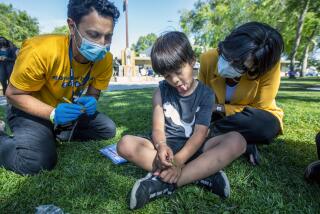Shorter lines and TikTok ads: California’s push to beat vaccine hesitancy
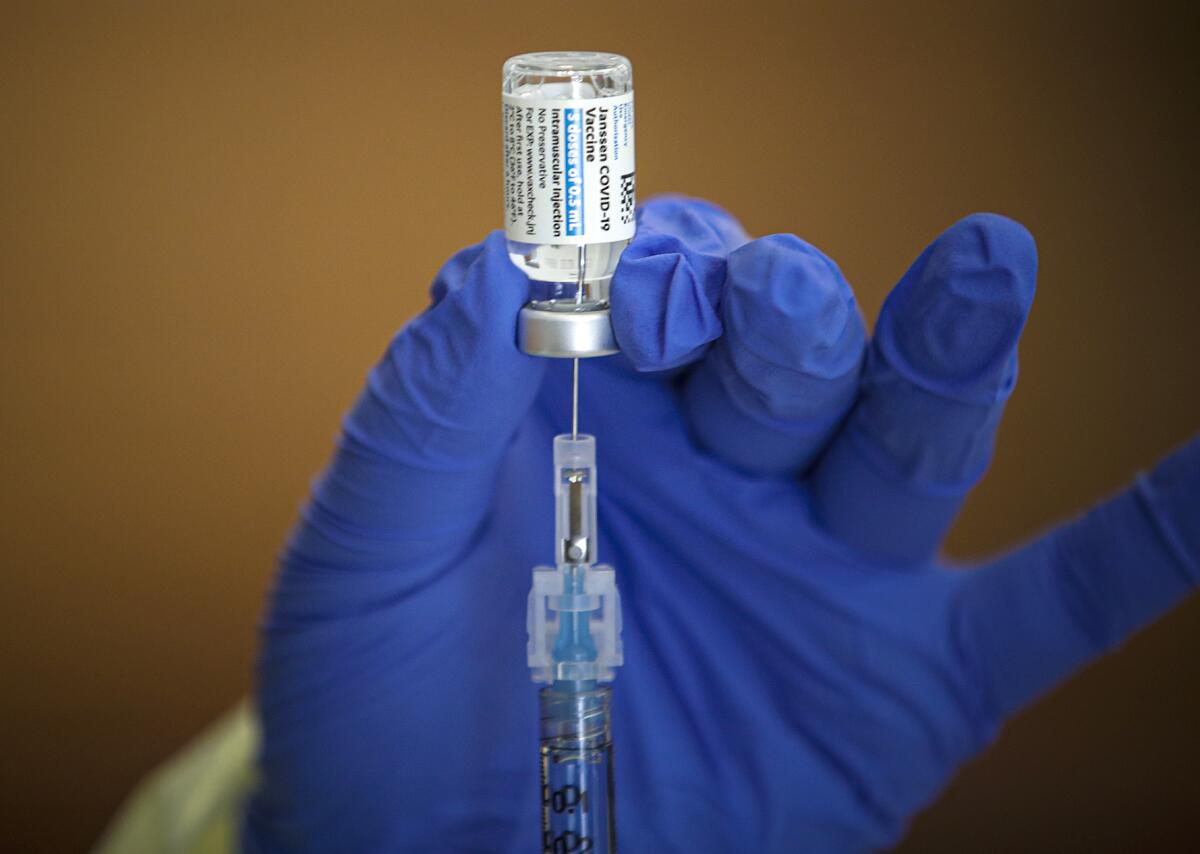
- Share via
Your brother is dying. I want you to come visit, and I want you to be vaccinated.
Until she heard the urgent plea from her sister-in-law, Anne Block, 72, had been unmoved by appeals from friends and family to get the COVID-19 vaccine. She had always trusted her strong constitution and preferred getting sick to getting the shot — but the message from her family shook her.
“I had to respect her request,” said Block, a tour operator in Los Angeles. Her decision to get the Johnson & Johnson shot made her one of millions of once-skeptical Americans who changed their minds about the COVID-19 vaccine.
Like swing voters in an election, those who have yet to be vaccinated will determine the outcome of the United States’ vaccination campaign, including how quickly the spread of the virus will stall and to what extent the disease will calcify into a long-term threat.
President Biden is pushing to get a first dose to 70% of Americans by July 4. That ambitious goal may be out of reach in many parts of the country but could still be attainable in California, where nearly 50% of the population has received at least one dose, vaccine skepticism is lower and the effects of the pandemic have reached further into everyday life.
Moving the needle another 20 percentage points in the Golden State will be significantly harder, experts say — but it may still be possible with the right combination of incentives and rationale, which will intensify as vaccine appointments plateau.
The relative lack of reluctance has been a boon for the state’s inoculation campaign — though a Times analysis shows some conservative rural areas remain more disinclined to get the shots.
In an effort that resembles a “get out the vote” campaign, California is hiring 2,000 canvassers to phone bank and knock on doors, and is running a flurry of ads and testimonials on television, radio and TikTok.
Similar campaigns are unfolding in group texts and at family barbecues as vaccinated Californians push their loved ones to get the shot.
The state is also expanding its efforts to target Californians who don’t have cars, reliable internet access, paid sick leave or doctors they trust. Officials are coordinating free transportation, setting up kiosks outside high-traffic areas like malls and train stations, and opening more clinics for walk-in appointments, as are CVS, Walgreens, Rite Aid and other pharmacies receiving doses from the federal government.
“We’re getting to a point where, if you ask people to take the vaccine, if you have the vaccine right in front of them, they’ll take it,” said Dr. Richard Pan, a state senator and vaccine advocate. “But you have to find them. They’re not going to come to you.”
The Golden State still faces an uphill battle against distrust and misinformation, including from influential public figures like Kanye West, who claimed last year that the vaccine is the satanic “mark of the beast.” Joe Rogan, whose Spotify podcast is downloaded some 190 million times a month, questioned last month whether young, healthy people should get vaccinated. (Yes, they should, health officials say.)
“It’s easy to think that there’s something unique about people who use vaccines and people who don’t,” said Jennifer Reich, a sociologist at the University of Colorado Denver and an expert on vaccine hesitancy. “But they really are the same people, just at different points in time or they’re just weighing information differently.”
Polling conducted for the state suggests that 1 in 4 Californians, and a higher share of young people and essential workers, are still on the fence. Some have been waiting until the long lines and the hassle of the mass vaccination centers die down. Others will agree if the vaccine is required or encouraged for traveling, attending concerts or returning to the trappings of normal life, like seeing friends, going back to work or easing up on mask wearing.
That includes Andrew Reyna, 27, who was desperate to get his life back to normal after catching the virus, losing his job and missing the funeral of a beloved uncle.
Vaccine hunters are the unofficial heroes of the coronavirus age. Wielding smartphones and tablets, PCs and Macs, these internet wranglers blast through barriers that stand between loved ones’ arms and COVID vaccines.
The Whittier resident’s Facebook feed had been filled with false conspiracy theories from family members who said the shots contained aborted fetal tissue or a microchip created by Bill Gates. But Reyna did his own research with more reliable sources — including a cardiologist with 124,000 Instagram followers — and said a prayer: You know what, God? I’m going to do this and be the example for my friends.
“I don’t want to be one of those skeptical Christians who thinks this is some kind of end-times microchip,” Reyna said. “I don’t want to be affiliated with that, and I don’t want other people to think that, either.”
Now fully vaccinated, Reyna is sharing pro-vaccine memes and fact-checks on Instagram to counter the misinformation, and he has convinced his grandparents and several friends to get the shot, too. His parents haven’t been swayed yet, he said, but he thinks he can still win them over.
“It is possible to have people change their mind,” Reyna said. “I’m able to tell people: ‘Dude, just get it! I got it, I was skeptical at first, and it was fine. Now it’s your turn.’ If they see someone like me doing it, they’ll be inclined to do the same thing.”
Creating a social norm around vaccinating is one of the most effective ways to convince people who haven’t gotten vaccinated, Pan said. That could mean a testimonial from a politician or a celebrity, but more often, it’s a vaccinated friend or family member who can answer questions, talk about the process and show that nothing bad happened.
A recent survey by TIME and the Harris Poll found that 59% of Americans who chose to get vaccinated said conversations with loved ones influenced their decision, and 56% cited knowing a loved one who had gotten the shot. The survey also found that 52% of people said they could not travel without it and 43% said they needed the shot to return to work or school.
To address “reasonable vaccine hesitancy,” Los Angeles County health officials are hosting Q&A phone calls and working with religious groups and nonprofits to disseminate information, said Barbara Ferrer, director of the Department of Public Health. People have “brilliant questions, and the right questions” about the safety and the efficacy of the vaccine, and they need “accurate information” so they can make up their minds, she said.
The push comes as the county’s once-insatiable vaccine demand has slowed. First-dose appointments at county sites dropped by half at the end of last month. The city of Los Angeles is no longer requiring appointments at its vaccination sites and is planning to wind down the Dodger Stadium mega-site by the end of May.
The county is also planning to set up vaccine kiosks in high-traffic areas such as outside grocery stores, malls and schools to make the vaccine quick and easy to access, Ferrer said.
Vaccination pressure from employers and from the private sector may also help move the needle.
Some major universities — including USC and the University of California and California State University systems — have said they will require the vaccine for students and employees.
The directive is the largest of its kind in U.S. higher education and would likely take effect this fall after the FDA formally approves the vaccines.
Live event spaces are also promoting the shots, with Dodger Stadium and Petco Park in San Diego offering special seating sections for the inoculated. (In New York, Mets and Yankees fans can get vaccinated at the ballparks, then get free tickets to the game.)
Among young adults who do not want to get the shot as soon as possible, 40% said they would be more likely to get vaccinated if required by airlines; 39% if required at concert venues and sporting events; and 38% if required for international travel, according to recent polling by the Kaiser Family Foundation.
Phil Kowal, a 73-year-old in Laguna Woods, thinks the COVID-19 vaccine is bogus, but he got it anyway. He and his girlfriend had been taking zinc with quinine to ward off the coronavirus — an approach not recommended by public health officials — and believe the pandemic is a ruse manufactured by the wealthy elite to get former President Trump out of office.
But they were desperate to get on a cruise ship again and worried they would be barred from travel if they weren’t vaccinated. He said, “We basically got the vaccine believing it’s nothing more than holy water.”
Another trusted messenger: healthcare providers. The Kaiser Family Foundation’s April polling found that among people who have not been vaccinated, 43% of adults younger than 29, 26% of people age 30 to 49, and 21% of people ages 50 to 65 would be more likely to get the shot if it were offered at their doctor’s office.
At the Sacramento County Primary Care Clinic, Dr. Stephany Sanchez has been having “the talk” with her patients toward the end of their appointments for diabetes, high blood pressure and other health conditions. She asks them if they’ve considered getting vaccinated, and sometimes she offers a dose on the spot.
“They’re not of their own volition bringing up getting the vaccine,” Sanchez said.
Sanchez, like most of her patients, is a native Spanish speaker who has built a longstanding relationship with many patients, making them more willing to trust her with healthcare decisions.
Some patients are interested but haven’t had the chance, and others are concerned about side effects, she said. Most decide to get vaccinated.
Those who outright refuse are in the minority. She estimates she’s helped convince at least a couple of hundred patients to get vaccinated.
For the grandparents of Christina Oriel, the deciding factor was very simple: hugs.
The 28-year-old Pasadena resident had been surprised to learn that neither her grandfather nor her grandmother wanted the vaccine. Both get regular checkups and trust their doctors, she said, but they had heard through friends and YouTube videos that the mRNA technology was too new to be safe.
After they skipped a vaccination appointment booked for them by a family member, Oriel began pushing harder, reaching out nearly every day for two weeks to try to change their minds. They were unmoved, she said, until she shared Dr. Anthony Fauci’s announcement that fully vaccinated grandparents could hug their grandkids again.
They soon made appointments at a local Walgreens, and — to Oriel’s relief — the rest of the adults in their household followed suit.
“Speaking as a granddaughter first really worked,” Oriel said.
More to Read
Sign up for Essential California
The most important California stories and recommendations in your inbox every morning.
You may occasionally receive promotional content from the Los Angeles Times.
